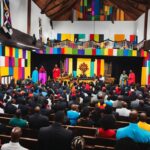Welcome to our in-depth exploration of the diverse roles found within the church. In this article, we will delve into the essential functions and significance of church roles, from apostles to teachers. These roles, rooted in biblical teachings and spiritual gifting, play a vital role in the leadership hierarchy of the church. By understanding their origins, beliefs, and practices, we can gain a deeper appreciation for the diverse contributions made by individuals in these roles.
Key Takeaways
- Church roles, such as apostles, prophets, evangelists, pastors, and teachers, contribute to the unity and maturity within the church.
- The five-fold ministry presents a holistic and balanced approach to effective ministry, challenging traditional hierarchical leadership models.
- Sacraments and rituals are integral to the expression and experience of church roles, enhancing their significance within the church.
- The five-fold ministry encourages shared leadership and accountability among clergy, promoting a team-based approach to leading the church.
- Worship practices and sacred texts are enriched by the diverse contributions of individuals in church roles, creating meaningful and transformative experiences for the congregation.
History and Origins of Church Leadership
Throughout history, God has ordained various models of leadership for His people. These models find their roots in both the Old and New Testaments, shaping the understanding of church leadership roles today.
In the Old Testament, leadership took on different forms and functions. Covenant bearers, individuals whom God chose to establish His covenant with, played a pivotal role in leading the people of Israel. Direct divine appointments, such as Moses and Joshua, demonstrated God’s intention to guide His people through chosen leaders. Priests, judges, and kings also held influential leadership positions, overseeing religious rituals, dispensing justice, and governing the nation.
The New Testament introduced a shift in the concept of leadership. Jesus, the ultimate example of leadership, embodied multiple roles. He served as the King, establishing God’s kingdom on earth, the High Priest, mediating between God and humanity, and the Prophet, proclaiming God’s truth and revealing the way to salvation.
The biblical models of leadership in both the Old and New Testaments laid the foundation for the five-fold ministry recognized today. Understanding the historical origins of church leadership enables us to recognize the significance and relevance of these roles within the church.
| Old Testament Leadership | New Testament Leadership |
|---|---|
| Covenant Bearers | Jesus as King, Priest, and Prophet |
| Direct Divine Appointments | |
| Priests | |
| Judges | |
| Kings |
“For even the Son of Man came not to be served but to serve, and to give his life as a ransom for many.” – Mark 10:45
Beliefs and Doctrines of the Five-Fold Ministry
The five-fold ministry is founded on the belief that God has divinely appointed individuals with specific roles to lead and nurture the church. These roles, stemming from biblical teachings, serve distinct purposes in equipping believers and fostering spiritual growth.
Each role within the five-fold ministry brings unique giftings and functions. The apostle is a visionary and pioneer, carrying a burden to establish and expand the Kingdom of God. The prophet serves as a vessel for divine messages, discerning and proclaiming God’s will. The evangelist is passionate about sharing the gospel, reaching out to the lost and facilitating conversions. The pastor offers care, guidance, and spiritual nourishment to the flock, tending to their needs. And the teacher imparts knowledge and understanding of God’s truth, equipping believers for a mature faith.
These roles, working together in harmony, complement and strengthen the church as a whole. They facilitate unity among believers, inspire spiritual growth, and encourage the exercise of spiritual gifts for the edification of the body of Christ.
“And He Himself gave some to be apostles, some prophets, some evangelists, and some pastors and teachers, for the equipping of the saints for the work of ministry, for the edifying of the body of Christ.” – Ephesians 4:11-12
The Biblical Foundation
The foundation of the five-fold ministry is firmly rooted in biblical teachings. These roles find their origins in the New Testament, where Jesus Himself exemplified aspects of each role during His earthly ministry. His apostolic authority, prophetic teachings, evangelistic outreach, pastoral care, and instructive teachings laid the groundwork for the five-fold ministry.
Additionally, the early church in Acts provides further evidence of the apostolic, prophetic, evangelistic, pastoral, and teaching functions at work. The apostles boldly preached the gospel, performed signs and wonders, and established the early church. Prophets provided divine guidance and instruction, evangelists proclaimed the good news to the masses, pastors cared for the flock, and teachers imparted knowledge and wisdom.
By recognizing and embracing the biblical foundation of the five-fold ministry, the church can access the fullness of God’s intended design for leadership and spiritual development.
Unity and Maturity in Faith
The five-fold ministry functions not only to equip believers but also to foster unity and maturity in faith. Its diverse roles serve as a cohesive unit, contributing to the overall growth and edification of the church.
Together, these roles promote a holistic approach to ministry, ensuring that believers receive comprehensive care and guidance. The apostolic, prophetic, evangelistic, pastoral, and teaching functions address various aspects of spiritual development, fostering a balanced and complete Christian experience.
By understanding and embracing the beliefs and doctrines of the five-fold ministry, the church can navigate challenges, enhance leadership effectiveness, and experience greater unity and maturity in faith.
| Role | Function | Examples from Scripture |
|---|---|---|
| Apostle | Visionary leadership, establishing and expanding the Kingdom of God | Paul, Peter, James |
| Prophet | Proclaiming God’s messages, discerning His will | Elijah, Isaiah, John the Baptist |
| Evangelist | Sharing the gospel, reaching out to the lost | Philip, Paul, Timothy |
| Pastor | Caring for, guiding, and shepherding the church | Jesus, Peter, Timothy |
| Teacher | Imparting knowledge and understanding of God’s truth | Paul, Apollos, Timothy |
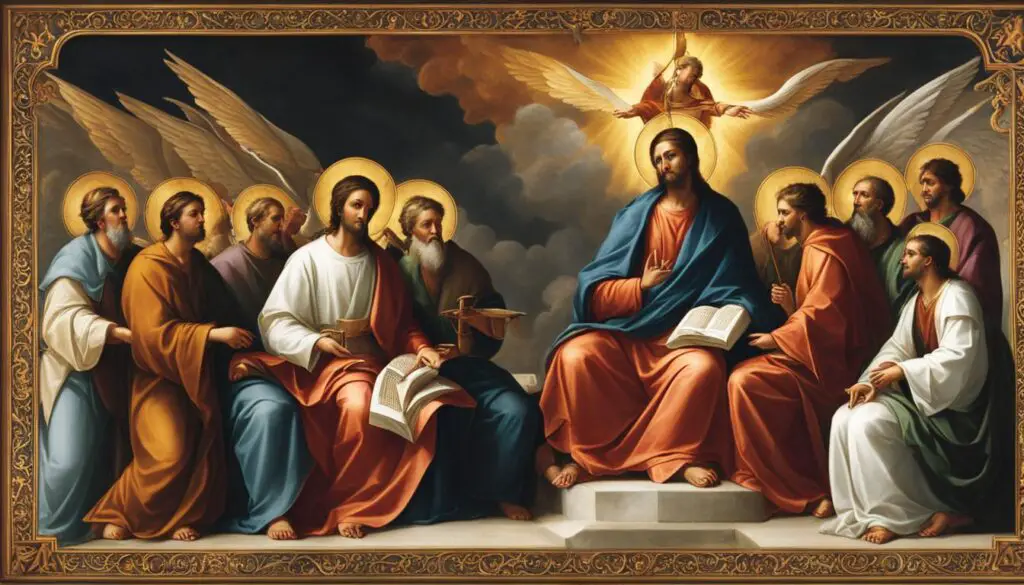
Sacraments and Rituals in Church Role Practices
While the five-fold ministry does not specifically focus on sacraments and rituals, these practices are integral to the overall functioning of church leadership. The administration of sacraments such as baptism and the Eucharist, as well as the observance of rituals like prayer and worship, are ways in which the roles of apostles, prophets, evangelists, pastors, and teachers are expressed and experienced within the church.
These sacraments and rituals are deeply rooted in the traditions and teachings of the church, providing spiritual nourishment, fostering community, and symbolizing significant moments of faith. They serve as powerful reminders of God’s grace, presence, and transformative work in the lives of believers.
The Sacrament of Baptism
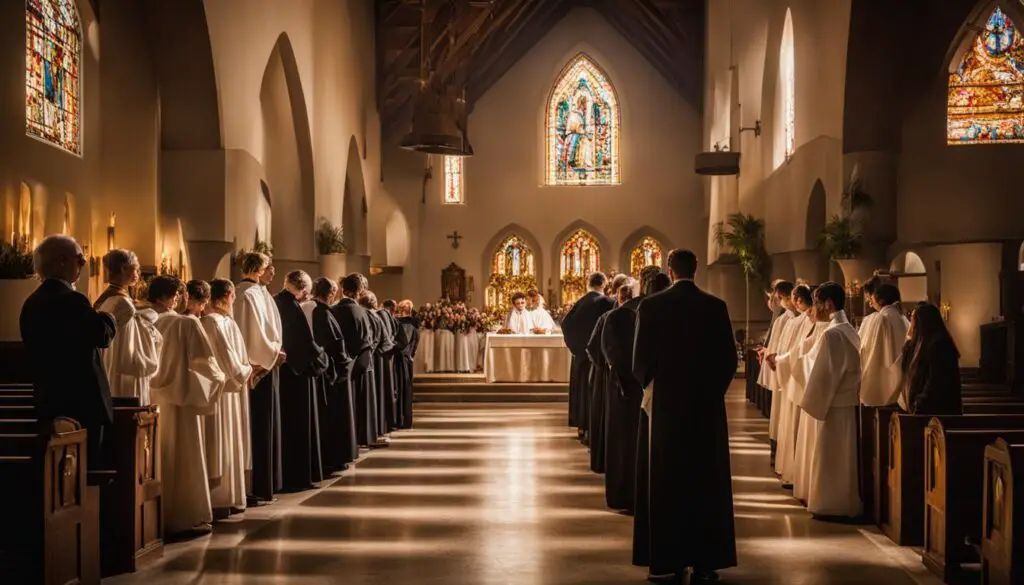
Baptism is one of the central sacraments in the Christian faith. It represents the believer’s identification with Christ’s death, burial, and resurrection. Through baptism, individuals publicly declare their faith and commitment to following Christ. This sacrament signifies initiation into the family of God and the washing away of sin, symbolizing a new life in Christ.
Although baptism is not exclusive to any particular church role, it is often administered by pastors, who play a vital role in guiding individuals through its significance and meaning. The act of baptism is a visible expression of the spiritual transformation that takes place within an individual’s heart.
The Sacrament of the Eucharist
The Eucharist, also known as the Lord’s Supper or Communion, is another essential sacrament in Christian worship. It commemorates Jesus’ Last Supper with his disciples, where he instituted the practice of sharing bread and wine as symbols of his body and blood, given for the forgiveness of sins.
The Eucharist is a sacred and profound ritual that unites believers in the remembrance of Christ’s sacrifice and his ongoing presence and work in their lives.
In many churches, the Eucharist is administered by pastors or priests, who partake in the distribution of bread and wine to the congregation. This sacrament not only nourishes the spiritual life of believers but also emphasizes the unity and fellowship of the community as they partake in the body of Christ together.
Rituals of Prayer and Worship
In addition to sacraments, rituals of prayer and worship play crucial roles in the practice of church leadership. Prayer, as a spiritual discipline, allows believers to communicate with God, seek guidance, express gratitude, and intercede on behalf of others. Whether in private or corporate settings, prayer is an essential element that underpins the work of all church leaders.
Worship, on the other hand, encompasses a range of rituals and expressions that acknowledge and exalt God’s presence and majesty. It includes elements such as singing hymns and songs, offering praises and thanksgiving, listening to the preaching of God’s Word, and engaging in acts of adoration and surrender.
Both prayer and worship create an atmosphere of reverence, leading believers into a deeper relationship with God and aligning their hearts and minds with His will. In the context of church leadership, apostles, prophets, evangelists, pastors, and teachers are actively involved in guiding and facilitating these rituals, ensuring that they are conducted in a meaningful and spiritually enriching manner.
The sacraments and rituals within church role practices serve as significant avenues for spiritual growth and the expression of faith. They reinforce the foundational beliefs and doctrines of the church while fostering unity, community, and a deepening of one’s relationship with God.
Leadership and Clergy in Church Roles
The five-fold ministry challenges the traditional hierarchical leadership structure seen in many churches. Instead of a lone senior pastor, the five-fold ministry emphasizes a team-based approach where individuals with specific gifts and callings collaborate to lead the church. This model recognizes that no one person can embody all the roles effectively and encourages shared leadership and accountability among the clergy.
“In the body of Christ, every member has a vital role to play. By embracing the five-fold ministry, we acknowledge the unique gifts and contributions of each individual, creating a diverse and harmonious leadership team.” – Bishop Angela Ramirez
When it comes to church leadership, the five-fold ministry provides a framework for effectively utilizing the spiritual gifts and talents within the congregation. This model promotes collaboration, fostering an environment where different perspectives and experiences are valued. It allows for a more holistic approach to leadership, where the diverse needs and challenges of the church can be addressed.
The five-fold ministry offers multiple benefits for both the clergy and the congregation. By distributing leadership roles among capable individuals, the burden is shared, preventing burnout and promoting personal growth. Moreover, this approach creates opportunities for mentorship and discipleship, as seasoned leaders guide and empower emerging talents.
Under the five-fold ministry, roles such as apostles, prophets, evangelists, pastors, and teachers work together, complementing each other’s strengths and compensating for weaknesses. While each role has its unique focus, all are essential for the growth and development of the church. The collaborative nature of this model ensures a balanced leadership that caters to the spiritual needs of the congregation.
The paradigm shift introduced by the five-fold ministry calls for a restructuring of traditional church hierarchies. It challenges the notion of a single authority figure and emphasizes the importance of a diverse leadership team. Clergy within the five-fold ministry need to prioritize communication, collaboration, and humility, working together to discern God’s guidance and lead the church effectively.
By embracing the five-fold ministry, churches can tap into the full potential of their leadership resources. This approach allows for a dynamic and adaptive response to the changing needs of the congregation and the community. It fosters a culture of shared responsibility, accountability, and mutual respect, resulting in a vibrant and thriving church.
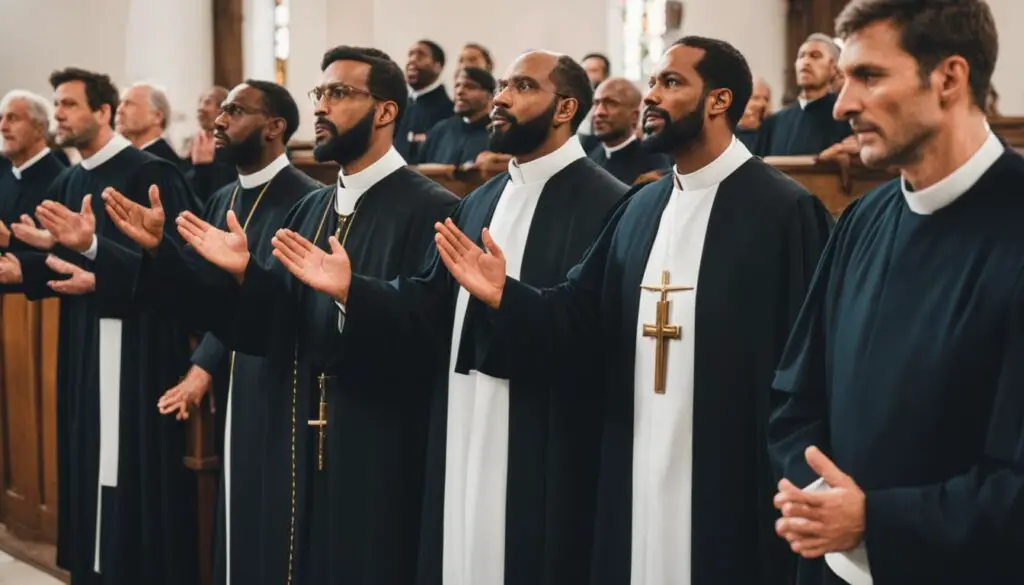
| Traditional Hierarchy | Five-Fold Ministry |
|---|---|
| Centralized decision-making | Collaborative decision-making |
| Single authority figure | Diverse leadership team |
| Vertical power structure | Horizontal power structure |
| Limited utilization of gifts | Optimal utilization of gifts |
Worship Practices and the Five-Fold Ministry
Worship is a vital aspect of the church experience, and the five-fold ministry plays a crucial role in shaping worship practices. Each role within the ministry brings unique contributions that create a transformative worship experience for the congregation.
Apostles: Bringing Freshness and Innovation
Apostles, as visionary leaders, bring fresh and innovative ways of worship to the church. They inspire creativity and encourage the exploration of new expressions of praise and adoration. Through their guidance, worship becomes a dynamic and evolving experience that connects believers with God on a deeper level.
Prophets: Sharing Prophetic Insights
Prophets have the ability to bring prophetic insights during worship. They listen to the voice of God and share His messages with the congregation. Through their discernment and spiritual sensitivity, prophets guide worship moments, bringing a sense of intimacy and divine encounter.
Evangelists: Creating Opportunities for Evangelism
Evangelists play a significant role in creating opportunities for evangelism within worship. They foster an environment where non-believers feel welcome and safe to explore their faith. By incorporating evangelistic elements into worship services, such as inviting people to respond to the Gospel, evangelists help lead others to Christ.
Pastors: Providing Pastoral Care
During worship, pastors provide pastoral care to the congregation. They shepherd the flock, offering comfort, encouragement, and support to individuals. Whether through praying for the needs of the congregation or offering words of assurance and guidance, pastors ensure that worship is a nurturing and healing experience for all.
Teachers: Imparting Biblical Teachings
Teachers play a vital role in worship by imparting biblical teachings. Through their knowledge and understanding of God’s Word, they help believers grow in faith and gain deeper insights into the scriptures. Teachers use worship as a platform to share biblical truths and impart spiritual wisdom that strengthens the congregation’s foundation of faith.
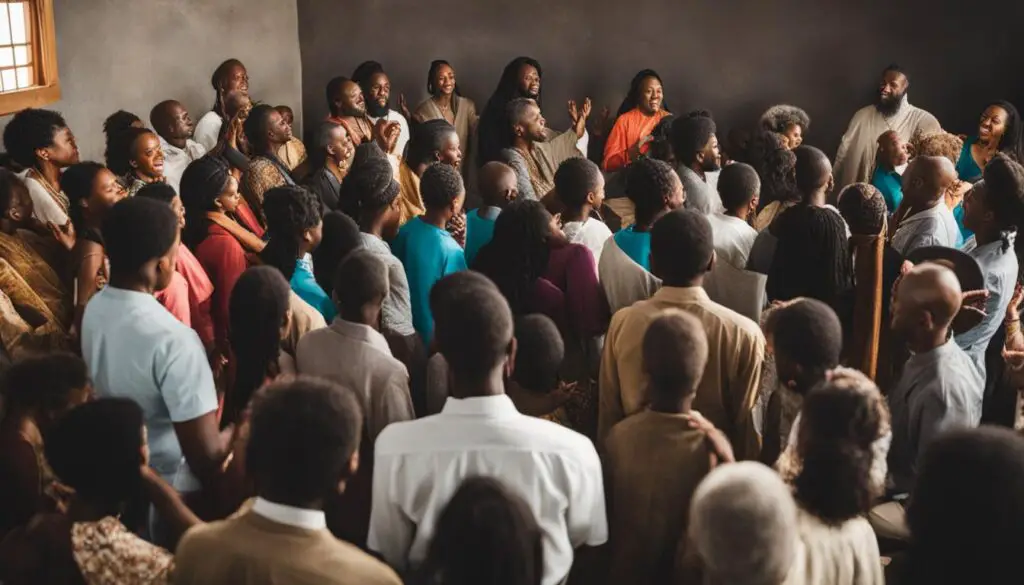
The collective contributions of apostles, prophets, evangelists, pastors, and teachers in worship practices create a harmonious and impactful worship experience. Together, they foster an atmosphere that encourages believers to connect with God, grow in their faith, and encounter His presence in a meaningful way.
Sacred Texts and the Five-Fold Ministry
The five-fold ministry finds its foundation and guidance in the sacred texts of the Bible. Each role within the ministry draws upon biblical teachings and principles to fulfill their specific responsibilities. Let’s explore how the apostles, prophets, evangelists, pastors, and teachers are influenced by the scriptures.
Apostles
The apostles, inspired by biblical figures like Paul and Peter, embrace their calling to pioneer new works and establish the Kingdom of God. They courageously embark on missions, following in the footsteps of those who were sent forth to spread the gospel throughout the world.
Prophets
The prophets, guided by scriptural truths, bring forth God’s word to His people. Just as the prophets of old delivered divine messages, today’s prophets speak with authority and revelation, aligning their words with the timeless truths found within the Bible.
Evangelists
Evangelists are passionate about sharing the gospel message, drawing inspiration from the biblical accounts of Philip and Paul. They proclaim the Good News, leading others to a personal relationship with Jesus Christ and encouraging believers to actively participate in the work of evangelism.
Pastors
Pastors, modeled after the shepherding nature of Jesus, provide care, guidance, and nurturing to the flock. They follow the biblical examples of David and the Good Shepherd in their ministry of tending to the needs and spiritual well-being of the congregation.
Teachers
Teachers in the five-fold ministry impart biblical knowledge and understanding to equip believers. They draw from the teachings of Jesus and the apostles, striving to lead others into a deeper comprehension of God’s truth and the application of biblical principles in their daily lives.
“All Scripture is inspired by God and is useful to teach us what is true and to make us realize what is wrong in our lives. It corrects us when we are wrong and teaches us to do what is right.” – 2 Timothy 3:16
| Role | Biblical Example | Responsibilities |
|---|---|---|
| Apostles | Paul and Peter | Pioneering new works, establishing churches |
| Prophets | Elijah and Jeremiah | Bringing forth God’s messages and revelations |
| Evangelists | Philip and Paul | Sharing the gospel message, leading others to Christ |
| Pastors | David and the Good Shepherd | Providing care, guidance, and pastoral support |
| Teachers | Jesus and the apostles | Imparting biblical knowledge and understanding |
Denominations and Sects in Church Roles
The concept of the five-fold ministry extends beyond denominational and sectarian boundaries, highlighting the unity and diversity within the body of Christ. While different denominations and sects may have their own interpretations and implementations of the five-fold ministry, the fundamental principles remain consistent. This diversity in church roles reflects the varied expressions of Christianity and the ways in which individuals respond to their calling and spiritual gifts within their respective communities.
Within denominations and sects, there may be variations in the emphasis placed on specific roles within the five-fold ministry. Some groups may highlight the apostolic or prophetic functions, while others may focus more on pastoral care or teaching. However, the overarching goal of these roles remains the same – to equip, edify, and lead the church towards spiritual maturity and unity.
The diversity in church roles across denominations and sects allows for a rich tapestry of perspectives and gifts to be woven together, creating a vibrant and holistic expression of the body of Christ. This diversity not only enhances the worship experience but also facilitates a broader understanding of God’s multifaceted nature.
Each denomination and sect brings a unique contribution to the broader Christian landscape. Their distinct interpretations and implementations of the five-fold ministry enrich the body of Christ, allowing for diverse expressions of worship, service, and ministry.
While denominations and sects may have differences in their specific practices, they are unified in their commitment to serving God and spreading the message of the gospel. This collaboration within diversity is a testament to the beauty and power of unity in the body of Christ.
Key Takeaways:
- Denominations and sects may have variations in their understanding and implementation of the five-fold ministry.
- The diversity in church roles reflects the diverse expressions of Christianity and the ways in which individuals respond to their calling and gifting within the church.
- While there may be differences in practices, denominations and sects are unified in their commitment to serving God and spreading the message of the gospel.
Contemporary Issues and Challenges in Church Roles
The five-fold ministry, with its emphasis on collaborative leadership and diverse roles, is not immune to the contemporary issues and challenges faced by church leadership today. These challenges can hinder the effective functioning of the ministry and impact the overall health of the church.
One significant challenge is the presence of power struggles within church leadership. When individuals in leadership positions vie for control and authority, it can create disunity and hinder the collaborative nature of the five-fold ministry. Resolving these power struggles requires humility, open communication, and a shared understanding of the purpose and importance of each role.
Another challenge is the lack of understanding of the roles within the five-fold ministry. It is essential for church members and leaders to have a clear grasp of the unique contributions and responsibilities of apostles, prophets, evangelists, pastors, and teachers. Without this understanding, there can be confusion, miscommunication, and a lack of alignment in the ministry’s goals and direction.
Misuse of authority is also a prevalent issue in church leadership. When leaders abuse their power or fail to exercise it responsibly, it can lead to spiritual and emotional harm within the church community. Holding leaders accountable and promoting a culture of servant leadership is essential for ensuring the ministry operates in accordance with its biblical foundations.
Finally, resistance to change can pose challenges to the implementation of the five-fold ministry. Adopting this model may require a shift in mindset and structure within the church, which can be met with resistance from those comfortable with traditional hierarchical leadership. Overcoming this resistance involves education, open dialogue, and emphasizing the benefits and biblical basis of the five-fold ministry.
FAQ
What are the different roles in church leadership?
The different roles in church leadership are apostles, prophets, evangelists, pastors, and teachers.
What is the purpose of the five-fold ministry?
The purpose of the five-fold ministry is to equip and build up the church, leading to unity and maturity in faith.
How do the roles in the five-fold ministry contribute to the church?
Each role serves a specific purpose in equipping believers and fostering maturity in faith. Apostles are visionary pioneers, prophets bring forth God’s messages, evangelists share the gospel, pastors provide care and guidance, and teachers impart knowledge and understanding of God’s truth.
How does the five-fold ministry challenge traditional church leadership?
The five-fold ministry emphasizes a team-based approach rather than a hierarchical structure, encouraging shared leadership and accountability among the clergy.
How do sacraments and rituals relate to church roles?
Sacraments such as baptism and the Eucharist, as well as rituals like prayer and worship, are integral to the overall functioning of church leadership and are expressed and experienced through the roles of apostles, prophets, evangelists, pastors, and teachers.
What is the biblical foundation of the five-fold ministry?
The five-fold ministry is rooted in biblical teachings and principles. Each role draws inspiration from the Bible to fulfill their specific responsibilities, aligning with the missions of biblical figures and imparting biblical knowledge and understanding.
How does the five-fold ministry transcend denominational boundaries?
While different denominations and sects may have variations in their understanding and implementation of the five-fold ministry, the core principles remain the same. The diversity in church roles reflects the diverse expressions of Christianity and individual responses to their calling and gifting within the church.
What are the contemporary issues and challenges in the five-fold ministry?
Contemporary issues and challenges in the five-fold ministry can include power struggles, a lack of understanding of the roles, misuse of authority, resistance to change, and the need for a shift in mindset and structure within the church.











